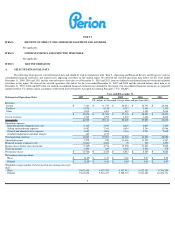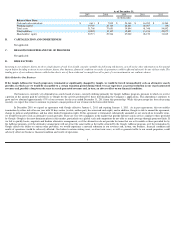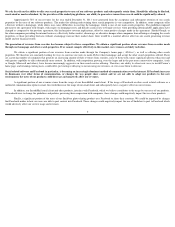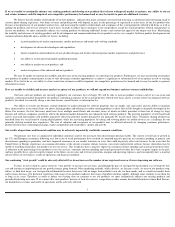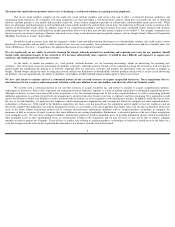Incredimail 2011 Annual Report Download - page 17
Download and view the complete annual report
Please find page 17 of the 2011 Incredimail annual report below. You can navigate through the pages in the report by either clicking on the pages listed below, or by using the keyword search tool below to find specific information within the annual report.
There is direct competition between web-based software and downloaded software.
There are different advantages and disadvantages to web-based software as compared to downloaded software. Currently, web-
based software seems to be
growing at a faster rate than downloaded software. Our business is currently reliant on the continued prevalence of downloaded software. If there were to be a more
dramatic shift to web-based software this could cause a decrease in the distribution of our software and subsequently in our revenues.
The Internet and Internet companies are providing an increasing number of services for free.
Internet based companies are providing an increasing number of services for free, including email clients and anti-
spam software and services. A substantial
part of our revenues comes from selling software products and services, currently accounting for approximately 20% of our revenues. We attribute part of the decline
in our revenues from the sale of products and services to this trend. Should this trend accelerate or even continue for a prolonged period, our revenues from product
sales and services would decrease further .
Our financial performance may be adversely affected by information technology, insufficient cyber-security and Other Business Disruptions
Our business may be impacted by disruptions, including information technology attacks or failures. Cybersecurity attacks, in particular, are evolving and
include, but are not limited to, malicious software, attempts to gain unauthorized access to data, and other electronic security breaches that could lead to disruptions in
systems, unauthorized release of confidential or otherwise protected information and corruption of data. Unidentified groups recently hacked numerous Israel-
based
internet websites in what many have perceived as politically motivated attacks and as an Israeli Corporation we could similarly be at risk for attacks targeting Israeli
entities in particular. We are not aware of material cybersecurity attacks directed at us in the past, but
may experience them in the future, potentially with more
frequency. We believe that we have adopted appropriate measures to mitigate potential risks to our technology and our operations from these information technology-
related and other potential disruptions, and are also seeking to obtain appropriate levels of insurance coverage with respect to such incidents. However, given the
unpredictability of the timing, nature and scope of such disruptions, we could potentially be subject to system downtimes, operational delays, other detrimental
impacts on our operations or ability to provide products and services to our customers, the compromising of confidential or otherwise protected information,
destruction or corruption of data, security breaches, other manipulation or improper use of our systems and networks, financial losses from remedial actions, loss of
business or potential liability, and/or damage to our reputation, any of which could have a material adverse effect on our cash flows, competitive position, financial
condition or results of operations.
New laws and regulations applicable to e-
commerce, Internet advertising, privacy and data collection and protection, and uncertainties regarding the
application or interpretation of existing laws and regulations, could harm our business.
Our business is conducted through the Internet and therefore, among other things, we are also subject to the laws and regulations that apply to e-
commerce.
These laws and regulations are becoming more prevalent in the United States, Europe, Israel and elsewhere and may impede the growth of the Internet or other online
services. These regulations and laws may cover taxation, user privacy, data collection and protection, pricing, content, copyrights, electronic contracts and other
communications, Internet advertising (including monitoring and tracking consumer behavior), consumer protection, the provision of online payment services,
broadband residential Internet access, and the characteristics and quality of products and services.
Many areas of the law affecting the Internet remain largely unsettled, even in areas where there has been some legislative action. For example, there is a
degree of uncertainty regarding the level of enforceability of different laws of countries in which the Company's products are being used. Therefore it is difficult to
determine whether and how existing laws, such as those governing intellectual property, privacy and data collection and protection, libel, data security and taxation,
apply to the Internet and our business. The US administration recently called for the creation of a Privacy Policy Office that would help develop an Internet "privacy
bill of rights" for US citizens and coordinate privacy issues globally. The US Commerce Department’
s prepared a report recommending a "framework" to protect
people from a burgeoning personal data-
gathering industry and fragmented US privacy laws that cover certain types of data but not others. New laws and regulations
may seek to impose additional burdens or restrictions on companies conducting business over the Internet. In Europe particularly, there is a major overhaul of the
European Data Privacy framework which appears more proscriptive and ambitious and, over the course of the next 12 months, we will begin to understand the impact
of this new proposed regulation which may demand further change in the way we conduct business and interact with our customers. With other national governments
also taking steps to enshrine consumer rights (e.g., the UK government has proposals to consolidate all consumer protections into a single new "Consumer Bill of
Rights") the level of consumer protections we face as a business is set to increase. We are unable to accurately predict the nature of the limitations that may be
imposed.
14


